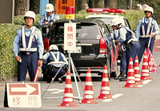
2008-06-29
KYOTO — Their region having played host to three Group of Eight ministerial conferences over the past month, many in Kansai are breathing a sigh of relief and hoping the security measures that residents, and even summit participants, found excessive are now in the past.
But human rights activists warn the heavy police presence and security checks seen in Kansai are setting a dangerous precedent for next month's G8 summit in Hokkaido and future international events throughout Japan.
In May, Kobe hosted the G8 environment ministers meeting amid unusually tight security.

Several days before the summit, some local media got wind that a ship belonging to Sea Shepherd, the conservation group that clashed with the Japanese whaling fleet earlier this year, might dock in Kobe during the event.
NGOs present in Kobe suspect the rumor, which turned out to be false, was started by Japanese police seeking to justify the huge amount of money being spent on security this year for all of the related summits.
Kobe's Port Island, the site of the environment ministers conference, was a virtual fortress during the event, with traffic heavily restricted, many roads blocked off and hundreds of uniformed police officers and plainclothesmen patrolling the area.
Inside the Portopia Hotel, where the ministers met, guests and visitors had to undergo strict security checks that surprised even the top U.N. top climate change negotiator.
In Osaka, police began warning commuters in late April of security checks in subways for the two-day G8 finance ministers meeting in mid-June.
Traffic checks on the narrow, always crowded streets around the Osaka International Convention Center — the site of the meeting — tested the patience of many Osakans, a group not noted for their forbearance.
But the Kobe and Osaka events were topped by the security at the foreign ministers meeting in Kyoto on Thursday and Friday. Nearly 6,200 police officers were mobilized for the meeting.
Non-G8 visitors to Kyoto before and during the conference discovered that coin lockers in Kyoto Station were sealed and the Kyoto Imperial Palace, where the Kyoto Guesthouse is located, was closed off.
The Kobe and Osaka meetings saw no major demonstrations. But on Wednesday night, nearly 300 anti-G8 demonstrators marched peacefully through the streets of Kyoto.
Riot police shepherded the marchers through Maruyama Park and the historic Gion district while plainclothesmen, their faces hidden behind white masks and sunglasses, videotaped the demonstrators.
On June 10, Kyoto police raided the office of a local anti-G8 activist and arrested him on a four-year-old charge of illegally applying for unemployment insurance.
On Thursday, a South Korean labor activist opposed to the G8 meetings was forced to return home after being denied entry to Japan.
Cheong Ui Heon arrived at Kansai International Airport on Wednesday and was planning to take part in a demonstration that night, but was detained by Immigration authorities after allegedly being told the purpose of his trip to Japan was too vague.
Jun Yamamoto, secretary general of Asian Wide Cooperation Kyoto, an anti-G8 NGO, said it was clear both the June 10 arrest and the refusal to allow the South Korean activist into Japan were aimed at intimidating those the government fears, and warned the heavy security seen in Kansai this past month bodes ill.
"The G8 summits have provided a dangerous pretext for the authorities to use preventing terrorism as an excuse to violate the constitutional rights of Japanese and the human rights of foreigners entering Japan. As bad as the security in Kansai was, it's going to be worse at Hokkaido next month, " Yamamoto said.
By ERIC JOHNSTON